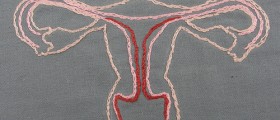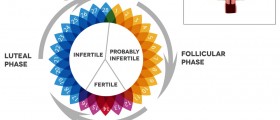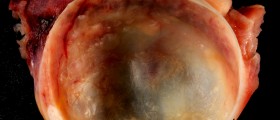
LH has multiple roles in reproduction. It provides a launch signal for the egg to leave the follicle, dissolving the tough protein fibers that hold it in place until the middle of the menstrual cycle. Concentrations of FSH peak on the third day of the menstrual cycle (the third day after the beginning of menstrual flow). After FSH stimulates the follicle holding the egg that will next be released in ovulation, the follicle itself secretes estrogen to thicken the lining of the uterus. Glands inside the brain sense the increase in estrogen and curtail the production of FSH. When this occurs, the follicle becomes sensitive to LH, which releases the egg and triggers the formation of the corpus luteum, a mass of tissue just outside the end of the ovary that generates progesterone that can help the egg implant itself in the lining of the uterus if fertilization occurs. If there is a pregnancy, LH levels stay high for a few weeks, but if there is no pregnancy, then LH levels fall during the second half of the menstrual period.
Many women with PCOS have high LH levels all the time. Since the uterus needs LH during the first few weeks of pregnancy, high LH levels tell the ovaries that there is pregnancy going on-even when there is not. This keeps eggs locked inside the ovaries, many of them encased in cysts. Oral contraceptives stop the feedback signals to the pituitary gland that keep LH levels high. Another way to lower LH levels, and one of the best natural PCOS treatments, is simply to lose weight. As a woman loses weight, blood sugar levels fall, the pancreas creates less insulin, the ovaries produce less testosterone, and many positive changes occur. Not only does the reduction in testosterone clear up acne and hair growth, lowering testosterone and insulin stops the cycle that keeps LH high and forms cysts.















_f_280x120.jpg)

Your thoughts on this
Loading...